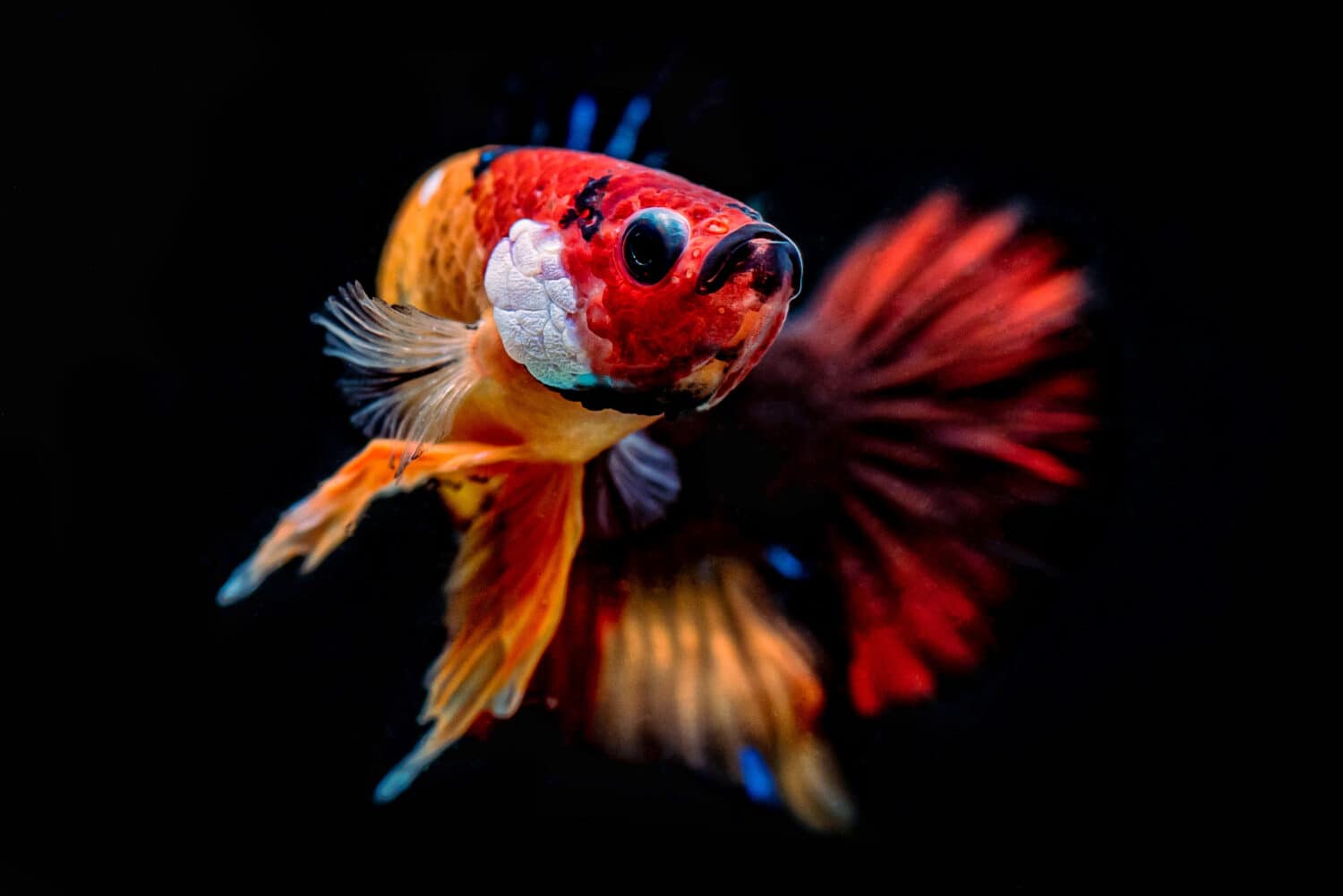Betta fish are common household pets with unique and bright coloring. This freshwater fish, also called Siamese fighting fish, requires unique and delicate care. However, they’re also known to be quite durable and adaptable, making them great pet fish — especially for children.
The average lifespan of a betta fish is 2 to 4 years, depending on various factors. To keep your beloved pet fish in good shape, consider the 10 most common causes of death of betta fish.
1. Genetics
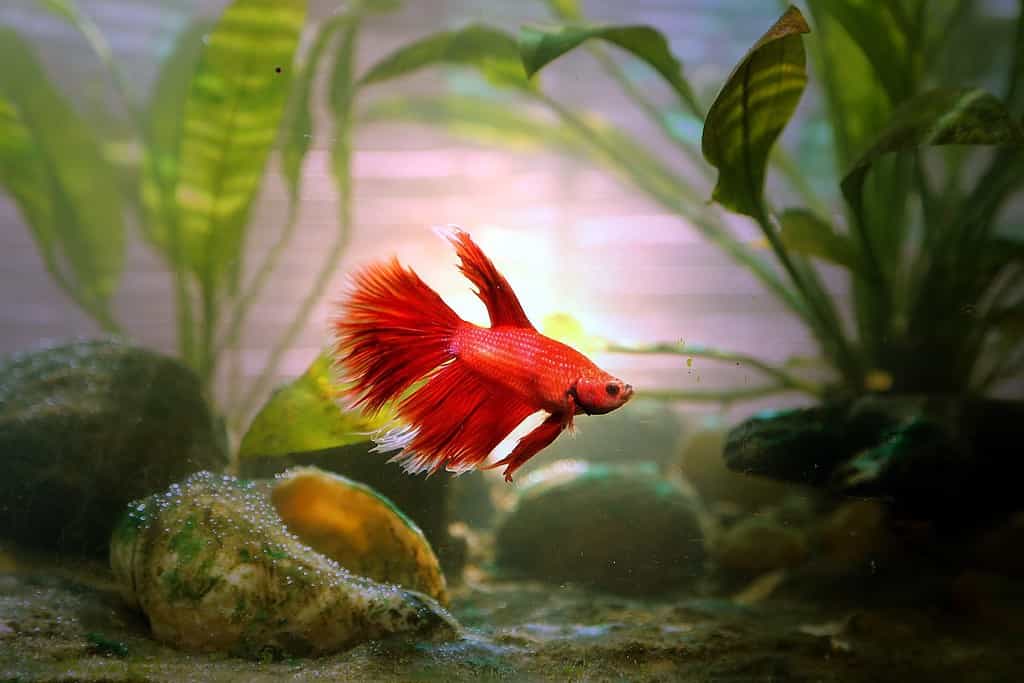
Betta fish come in a variety of bright colors.
©MANU PARADY/Shutterstock.com
Oftentimes, betta fish will die simply due to their genetics. Just as humans are more prone to developing certain health conditions because they run in the family, betta fish can inherit certain risk factors, too. Thankfully, purchasing your betta fish from a reputable breeder can decrease your risk of buying a pet fish with genetic conditions. However, some issues might merely be out of your control.
2. Poor Nutrition
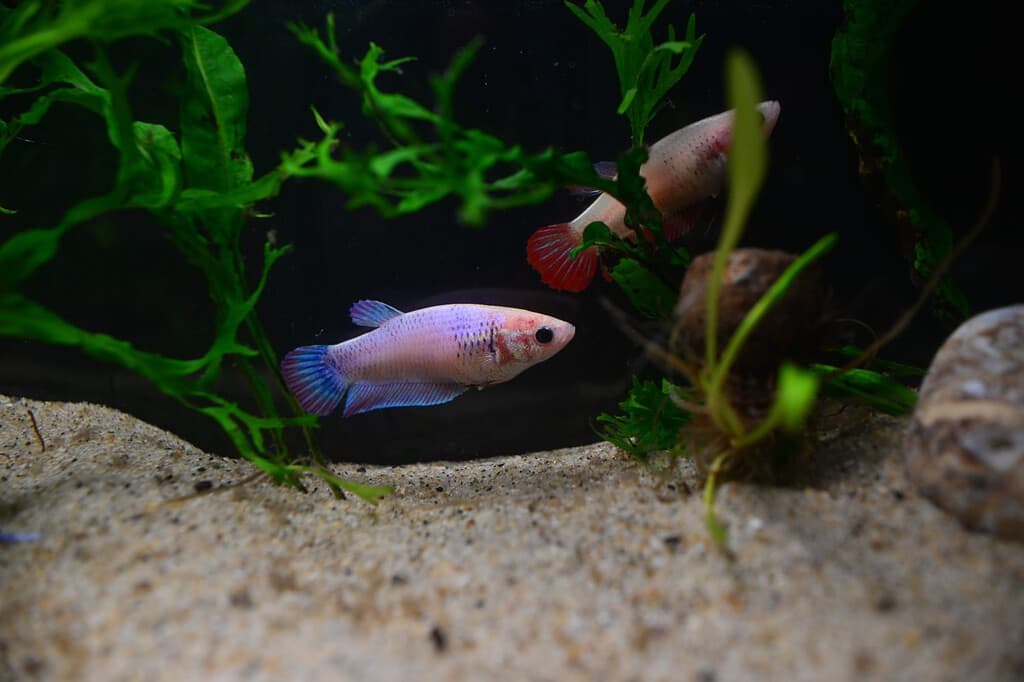
It’s important to make sure your betta fish isn’t overeating or undereating.
©ItsAngela/Shutterstock.com
Your betta fish needs certain nutrients to survive, so feeding your fighting fish the right food is crucial to its health. Most experts recommend betta pellets and flakes, as they contain the appropriate nutrients. Follow the recommended portions to ensure you aren’t overfeeding or underfeeding your betta.
Additionally, fish will sometimes stop eating, which can lead to dangerous effects as well. There are many reasons a betta fish will avoid its food, from poor water quality to stress. Once you identify the cause, you can hopefully address the issue and improve your fish’s nutrition.
3. Poor Water Quality
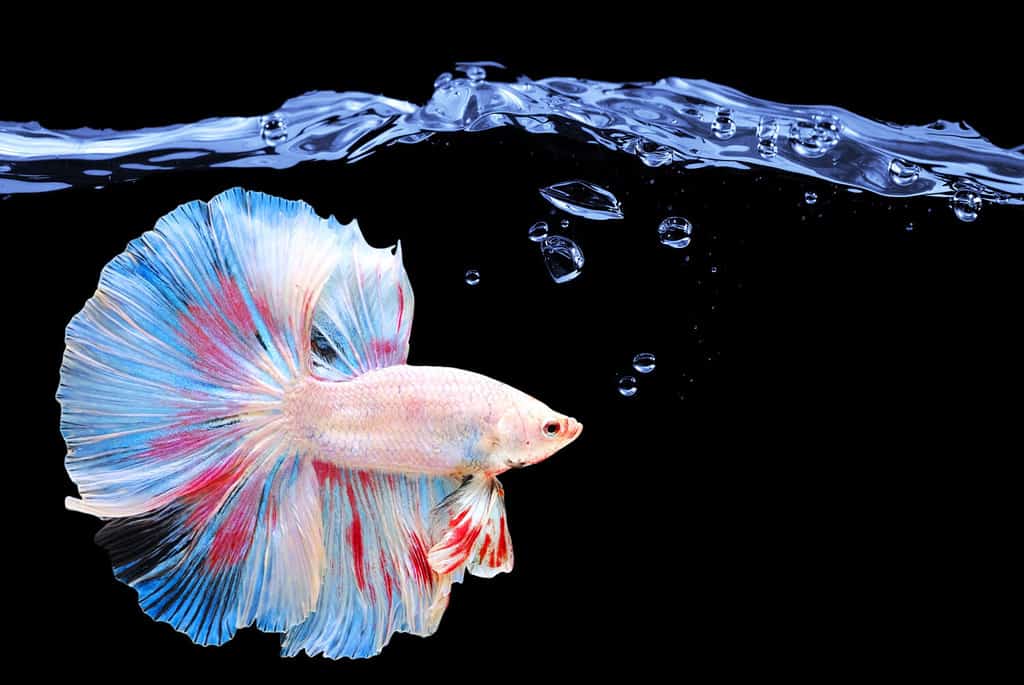
If you want your betta fish to be healthy and thriving, you must keep its tank and water clean.
©Shutterman70/Shutterstock.com
If you’ve ever overfed your fish or gone too long without cleaning its tank, you might have noticed old pellets or flakes floating or murky, dirty water. Most experts recommend cleaning your fish tank every one to two weeks. Failing to do so can cause your fish to contract life-threatening diseases and infections. In fact, this can lead to both ammonia and nitrate poison.
4. Low Water Temperature

Betta fish need to live in warm water, so you might want to buy a heater for your fish tank.
©Sunny_Smile/Shutterstock.com
Betta fish come from a tropical climate and prefer warm water. The ideal water temperature for them is between 76 to 81 degrees Fahrenheit. Since most homes don’t have a room temperature high enough to keep the tank’s water warm, you will likely need a heater to maintain the right temperature. If your betta’s water is too cold for too long, the fish might become withdrawn, sick, and eventually unable to survive.
5. Betta Fish Attack

Fighting fish will often attack one another if housed in the same tank.
©panpilai paipa/Shutterstock.com
Betta fish are called fighting fish for a reason: they can be quite aggressive. Male betta fish are especially aggressive and will often fight each other to death. In fact, they’ll even fight other fish — usually those that are bright-colored like themselves.
Betta fish attacks can be deadly, so if you want your beloved pet to live a long and healthy life, you might want to keep it in its own tank. Otherwise, they will likely grow territorial of their home and environment, which can quickly lead to deadly injuries. Don’t worry: betta fish don’t mind living alone, so while they might get bored in a small tank by themselves, it’s unlikely they’ll feel lonely.
6. Old Age
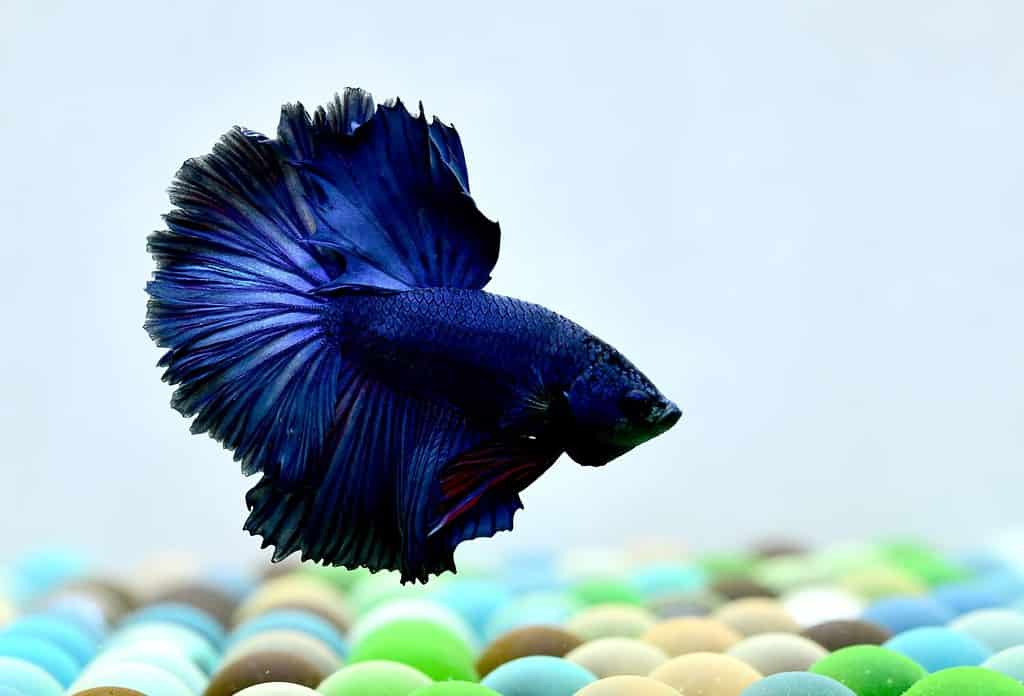
Unfortunately, betta fish don’t have a super long lifespan, especially when compared to fish like goldfish.
©bobbyphotos/Shutterstock.com
A simple and common cause of death is old age. Since betta fish have a short life span, many people assume there’s a more complex reason their fighting fish died. However, for a betta fish, the average age of death is around 2 to 4 years old. Some might live longer depending on various factors, but otherwise, it’s actually quite normal for your pet betta fish to die naturally after just a few years. You might notice it becoming lethargic toward the end of its life, so don’t be alarmed or blame yourself when this happens.
7. Overfeeding
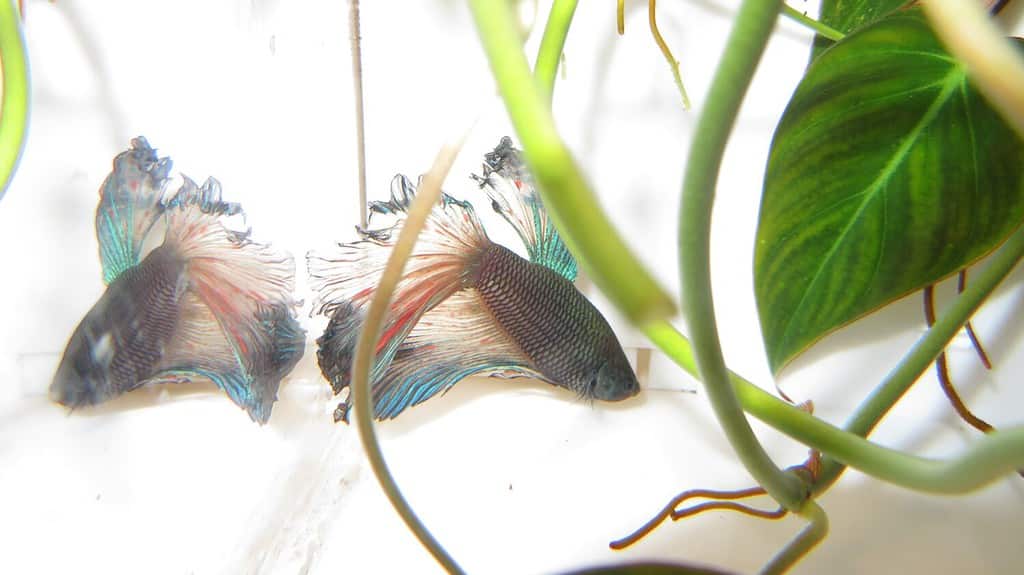
If a betta fish is exposed to too much ammonia, it will often develop ammonia burns.
©elisabet nugraheni/Shutterstock.com
Many owners make the mistake of overfeeding their fish, which can be detrimental to betta fish. In the wild, betta fish eat whatever food they can access. If you’re sprinkling excess food in your fish tank, odds are, your fighting fish will consume all of it. This can lead to bloating, fatty liver disease, obesity, and other health conditions.
If you’ve been overfeeding your betta fish, you might notice a change in its behavior and temperament. For instance, it might become more aggressive or lethargic, and you might even see physical signs of a swollen stomach. In this case, gradually decrease the amount of food you’re giving to your fish so as not to cause more serious complications.
Adding too much food to your betta fish tank can also lead to excess ammonia and nitrates in the water, which can poison and kill the fish. If you notice burns on its body, it could be a telltale sign of ammonia in the water.
8. Stress/Disease
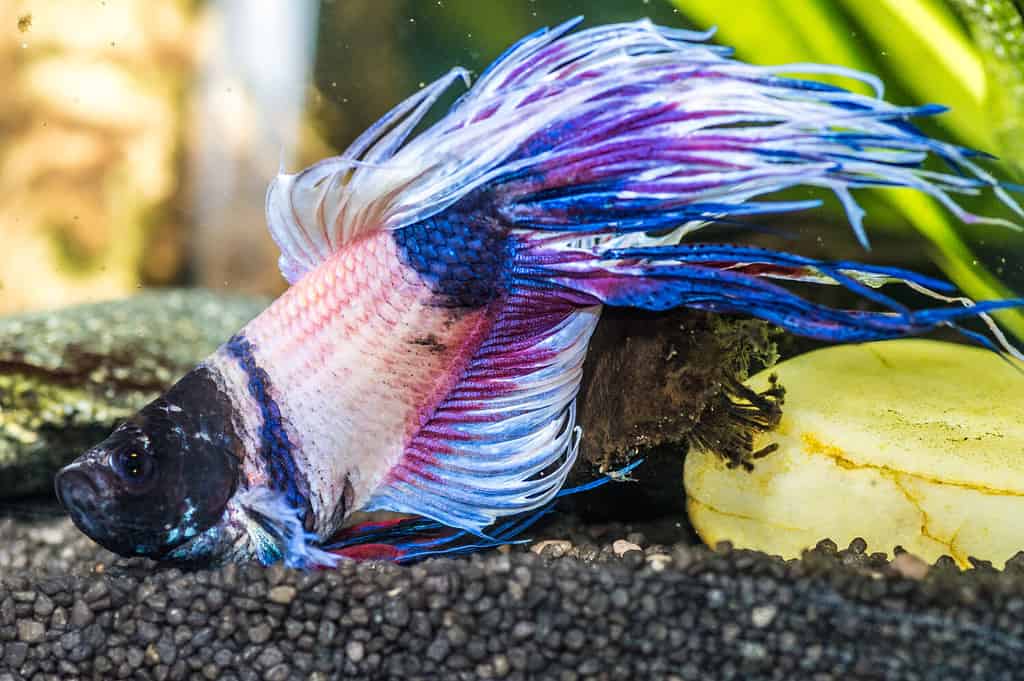
There are many signs of a sick betta fish, such as lethargy, burns, and poor appetite.
©Wirestock Creators/Shutterstock.com
Betta fish are prone to certain diseases with different prognoses depending on their environment and quality of care. For example, if you’re overfeeding your betta, it might develop fatty liver disease or digestive issues. If you’re not properly taking care of its tank, it can come into contact with deadly bacteria, fungi, and viruses. Genetics can also play a role in the development of fatal diseases or conditions.
Many betta fish will also get stressed if they’re in poor living conditions. Though they are adaptable creatures, betta fish can grow distressed when living in small spaces. For instance, if you fill a small bowl or vase with water and expect your betta fish to thrive, you might notice the opposite happens. Your betta fish tank should have a minimum of 2.5 gallons of water, but 5 gallons is ideal.
9. Injury
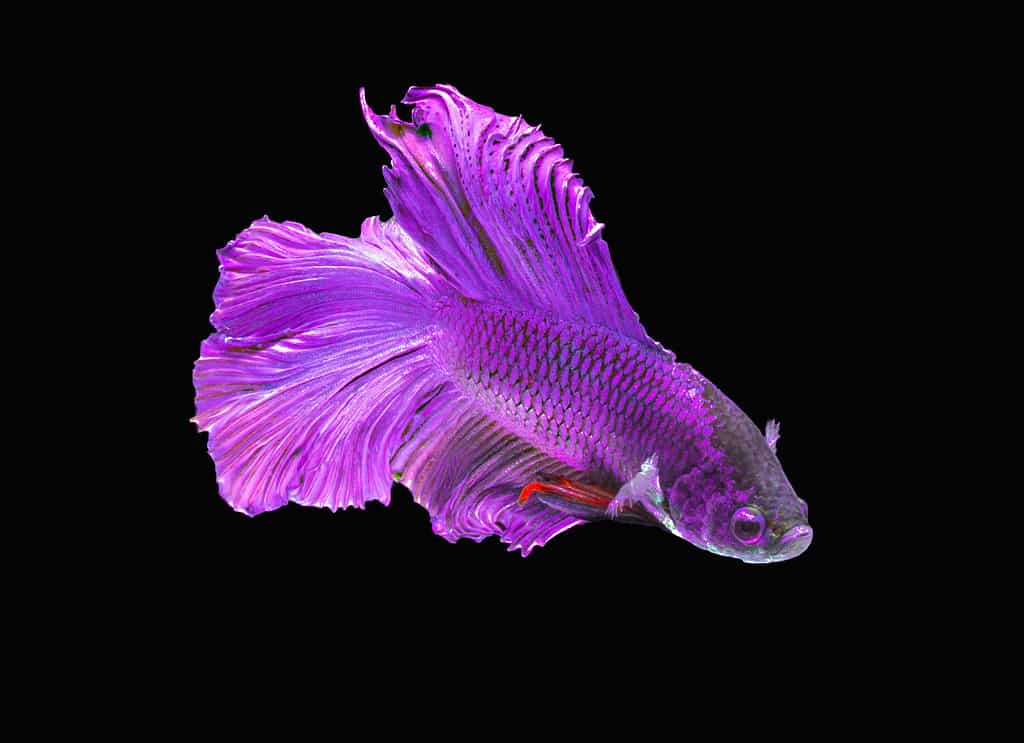
Betta fish have a reputation for being aggressive, which can often get them injured.
©GracePhotos/Shutterstock.com
Fish injuries are bound to happen from time to time — especially if you’re dealing with an aggressive betta. If your fish tank is filled with sharp decorations like fake plants, your betta fish might accidentally cut itself, leading to an infection or life-threatening injury.
Additionally, if you have multiple betta fish in one tank, they could seriously injure each other, ultimately leading to death. It’s best to keep betta fish apart for this very reason.
10. Chlorine Burn
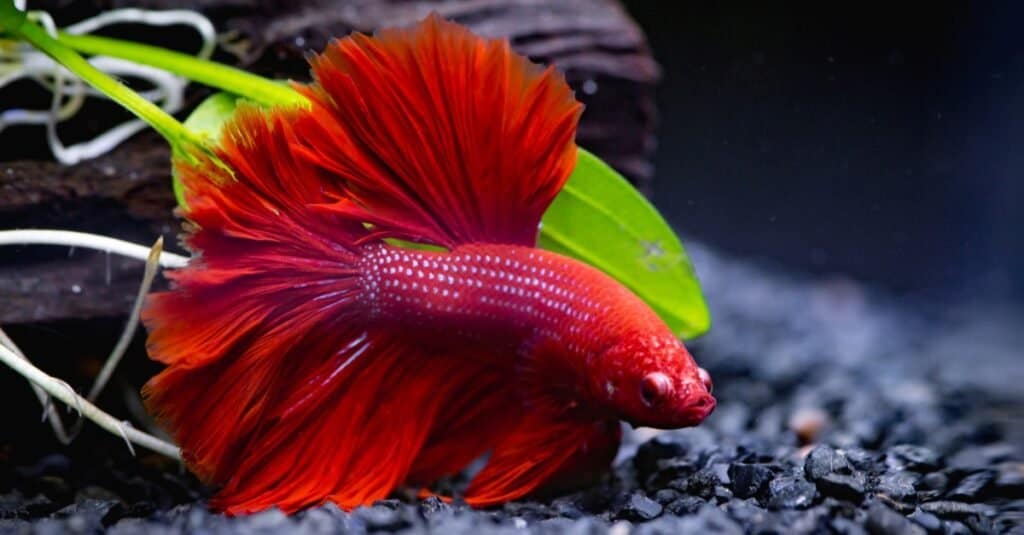
Check your tank’s water before potentially exposing your fish to chlorine.
©ANURAK PONGPATIMET/Shutterstock.com
If your betta fish lives in a tank with chlorinated water, it might perish. Chlorine exposure causes Siamese fighting fish to experience respiratory distress (sometimes even suffocation) due to it damaging their gills. If you notice your betta struggling to breathe, looking pale, or appearing to be covered in mucus, you’ll want to take the fish out of the tank and immediately transfer it to a clean, non-chlorinated tank. While you probably won’t be able to reverse the damage already done, your fish might end up surviving if it remains unexposed.
Betta Fish Care
With the proper care, your betta fish will likely live a full and fulfilling life. However, some common causes of death, like old age or genetics, are inevitable. When in doubt, provide your betta fish with the proper diet, a clean environment, and the necessary space to keep it healthy. If you notice any alarming symptoms or signs of illness, injury, or stress, take the right precautions to ensure they’re on the road to recovery.
Thank you for reading! Have some feedback for us? Contact the AZ Animals editorial team.

